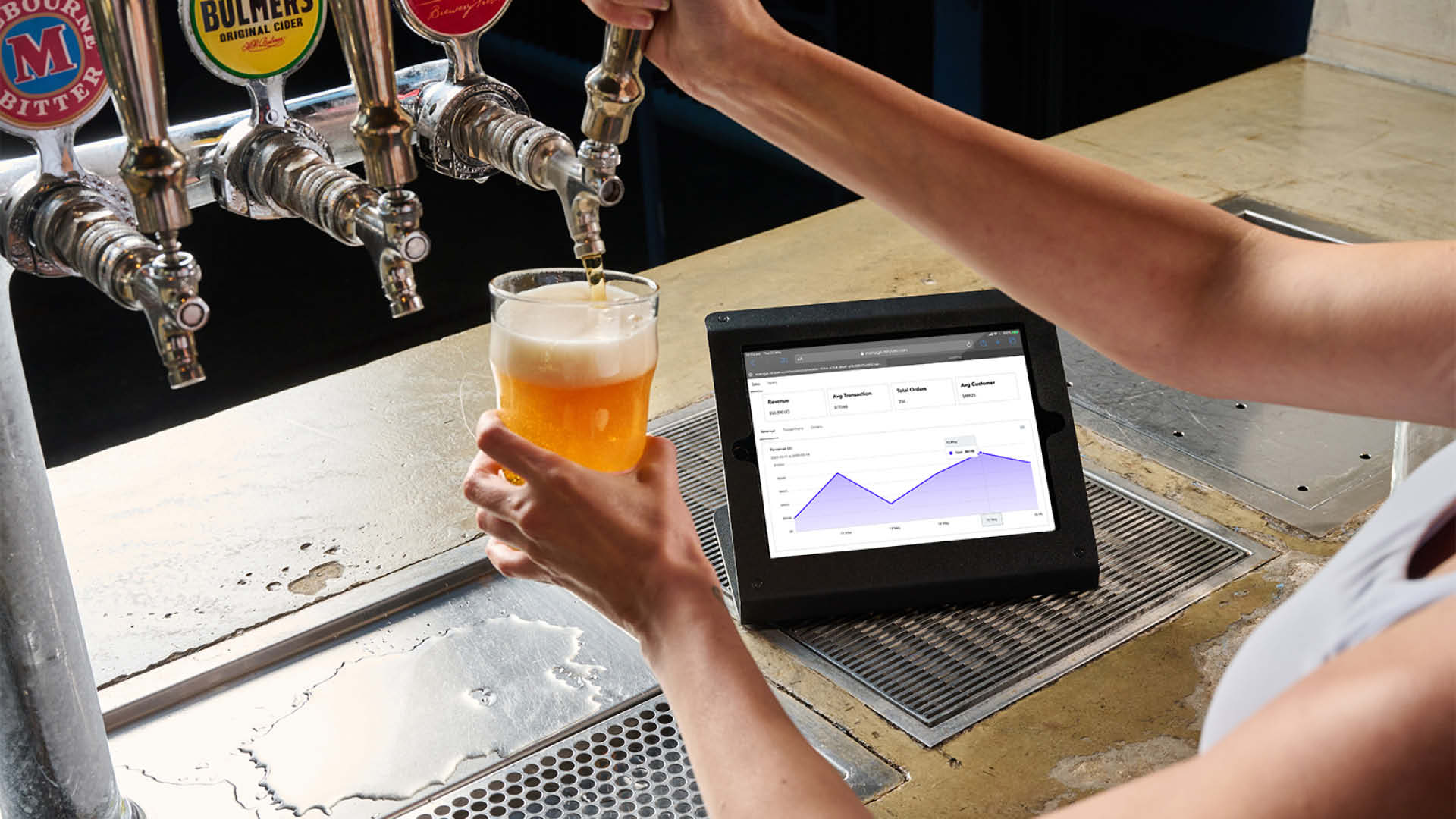Hospitality bookkeeping: accounting tips to get you started

Finance can be an intimidating part of starting and running your own hospitality venue. From payroll logistics and invoicing to making purchases and keeping a record of your business affairs and transactions -there’s a lot to consider. And if you’re undertaking this task on your own, due diligence is critical.
To get you started, we’ve put together a small guide of tips to help you steer your finances in the right direction.
Here’s how to nail bookkeeping for your hospitality venue
Go cashless 💸
The phase out of cash has been a long-winded affair that has been going on for years. But it’s no secret COVID-19 accelerated the shift from cash to digital, with Millennials and Gen Z paving the path towards a cashless future. The birth of tap-and-go and of course the ever-popular Apple Pay means less people regularly carry cash and card payments have skyrocketed.
Since COVID, cashless payments are also about hygiene—less people want to deal with items that countless others have touched. Plus, consumers feel like they spend less when they tap and go; as opposed to withdrawing cash from an ATM and tracking it as they spend.
But why is it a must for small business bookkeeping?
Firstly, reconciling takings and breaking down tips can be automated, instantly decreasing the time you spend on accounting and payroll. Secondly, there is less room for human error when you take physical cash out of the equation. This applies to keying in the total amount when customers are paying, and also to counting cash at close of business.
Did we mention it can up your revenue?
It comes as no surprise that cardless payments are faster and more efficient, but so what? Well, faster payments equals faster lines which equals more individual transactions. People are impatient; if a line is moving fast, they’ll wait but if it’s not, you can bet they’ll move on to the next cafe or vendor. By not dealing with cash counting and mental mathematics, you’re increasing the amount of sales you can process and the number of people you entice to spend at your venue. It’s a win-win!
Plus, it’s safer!
No physical cash in a venue means there’s much less chance it’ll be robbed. Without physical things to steal, a robber has no reason to break into an establishment—keeping you happy and your staff safe.
Know which taxes you have to pay 💰
Taxes are a huge part of small business bookkeeping and because each country, state and city may have different taxes they are responsible for, it’s important for hospitality venues to keep on top of this and ensure they’re paying the right taxes.
The tax you pay can be dependent on anything from how many business owners there are and how many employees you have to whether you sell alcohol or whether you’re a full-service restaurant or streetside vendor.
So what are some of the taxes you might have to pay?
Payroll Tax: Anyone who has employees will be familiar with payroll tax. It’s assessed on total wages paid to your employees each month, and is therefore dependent on the number of employees you have.
Tip Tax: If your staff or venue earns tips in any way, many countries require you to pay tax on your total earnings; so keep this in mind when divvying up tips to give to your employees.
Income Tax: This is a tax that applies to owners of any business as well as people who earn a personal income.
Sales Tax: This is called GST, VAT or TAX, depending on which country you operate in. In short, hospitality venues are charged a tax on the sale of goods and services and includes anything from food and beverage to merchandise—like T-shirts and tote bags—which they must pay back to the government.
Property Tax: Are you renting your venue space or do you own it? This makes a difference when it comes to property tax as you’ll likely have taxes associated with the ownership of your property or venue.
COVID-19 Tax: In the wake of the pandemic, some countries implemented certain taxes for hospitality venues and their employees. Be sure to confirm if any apply to your business.
Gift Card Tax: This is just like any other source of revenue in the hospitality business: it is subject to tax so it’s important not to think it is exempt.
These are just some of the general tax laws that apply across jurisdictions. Be sure to confirm your tax obligations with the relevant government agency or qualified professional
Understand your tax deductions 🤑
We’ve gone through what you owe, but what about how you can save? Increasing profit margins is on every hospitality owner’s mind and should be carefully assessed. Your tax deductions could save you thousands so here’s where to start.
Equipment: You need quality equipment to run a quality establishment. Not to worry, this is tax deductible. We’re talking about everything from ovens, fryers, dishwashers and stoves, and even the maintenance cost of keeping them up and running.
Marketing & Advertising: This includes anything from billboards, front-of-house signs and website fees to back-end marketing software tools and paid social media advertising.
Utensils: You don’t have to penny pinch when it comes to cutlery and crockery as it’s all tax deductible, as is the dish soap and any cleaning apparatus you need to keep them sparkling.
Decor: Stunning furniture, sleek fixtures and well-thought-out finishes make a difference to the ambience of a venue, so you can sleep at night knowing that these items are tax deductible too.
Back-End Services: Software you purchase and any platforms you have a subscription to that aid in the running of your venue are tax deductible. That’s everything from your POS system to your third-party accounting software.
Insurance: The list of what you might want to take insurance out for is extensive and can include staff insurance, delivery vehicle insurance, business insurance and restaurant insurance.
Legal Fees: Any costs associated with lawyers, accountants or financial advisors are tax deductible. This also includes things like the price associated with applying for a liquor license, restaurant permits, business names and filing trademarks.
Staffing Costs: The money you, as a business owner, spend on labour is tax deductible. That includes employee wages and salaries but also bonuses, sick leave, holiday leave, commision and even health plans. This also applies to contractors you may outsource.
This advice should not be used in lieu of a financial professional. Getting advice from a qualified accountant on allowable deductions will help minimise the amount of tax your business is liable for - and this cost is also a tax deduction!
Find the right accounting software 🧾
Different software is created for different businesses servicing different r business needs. Here are some things you’ll want to think about.
Was it created for small business bookkeeping?
This is important as accounting for small businesses differs from accounting for corporations. Small-business-friendly features—like automating invoices and invoice receipts—add up and will make your life a whole lot easier in the long run.
What is the mobile experience like?
If you’re the owner of a small hospitality business, you’re likely on the go a lot. You want a user-friendly interface that is just as seamless on mobile as it is on desktop so that you don’t have to worry about leaving the desk.
Does it deal with payroll?
Any staff you have means you’ll be dealing with payroll—whether outsourced or not—so finding an accounting software that caters to this is crucial.
How’s the reporting?
Reporting can often be an afterthought when assessing small business bookkeeping, but nailing this from the get-go can save you headaches in future. Find out whether the reporting functionality is adequate. Can you customise reports? Do you need to manually pull them or can it be automated? These things can really make your accounting experience frictionless.
Does it support your country’s tax?
It’s crucial to make sure your accounting software supports the country’s tax laws. This streamlines any dealings you have with tax by automating things like tax calculations and changing tax regulations.
Does it include all the features you want?
You don’t want to be paying for features you don’t need. Assessing this before you purchase will help you avoid additional costs.
Does it have an inventory system?
An internal inventory management system is ideal in order to manage requirements and mitigate human error. This is especially helpful if you have a range of products (or ingredients) that you keep inventory of.
Some great accounting softwares to take a look at are Xero, Dext, Wave and Reckon.










